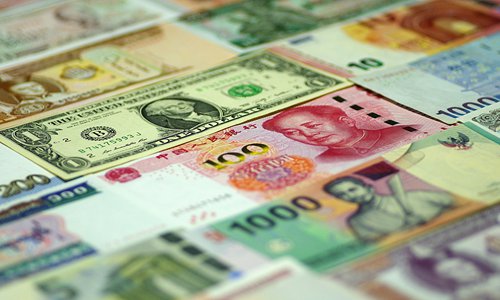HOME >> BUSINESS
Bank of China approved to launch yuan clearing service in Philippines
By Song Lin Source:Global Times Published: 2019/9/18 20:25:09

File photo: IC
The People's Bank of China (PBC), China's central bank, on Tuesday announced it had authorized the Bank of China's Manila branch to serve as the clearing bank for yuan business in the Philippines. Experts noted China has been steadily and unfalteringly promoting the yuan's internationalization.The Manila branch of the Bank of China (BOC) has established a yuan clearance system and helped the Philippine government to issue panda bonds in China's interbank market twice, with a total value of $3.96 billion, the Xinhua News Agency reported on Tuesday.
The BOC has launched yuan clearing services in 13 countries and regions, including China's Hong Kong, Macao and Taiwan regions, as well as the US, Japan, South Africa and other markets, according to the website of the BOC.
"China has maintained the world's leading growth rates of imports and exports, which has laid a solid foundation for its currency's internationalization," Xi Junyang, an economics professor at the Shanghai University of Finance and Economics, told the Global Times on Wednesday.
China's total foreign trade stood at 20.13 trillion yuan ($2.84 trillion) in the first eight months of the year, up 3.6 percent year-on-year, according to China's Ministry of Commerce (MOFCOM) on September 12.
China's overseas investment has seen stable gains as well, which is a major supporting factor for the yuan's internationalization, such as growing investments in countries and regions under the Belt and Road Initiative, Xi noted.
The MOFCOM on Tuesday said that China's overseas non-financial direct investment was 493.1 billion yuan in the first eight months of the year, up 2.7 percent year-on-year.
The Bank for International Settlements (BIS) on Monday issued its Triennial Central Bank Survey of Foreign Exchange, noting that with $284 billion in turnover in April, the yuan remained the world's eighth most-traded currency and the most-traded emerging market currency, accounting for 4.3 percent of the total turnover.
Experts slammed reports saying that the yuan's internationalization was at a standstill since its ranking has not seen much increase.
The yuan's internationalization does not equate with climbing in the global rankings, and other major currencies rankings remained still as well, Xi said, adding that trading prospects and China's role in the foreign exchange market are more important.
The Chinese mainland recorded a significant rise in trading activity, to $136 billion in 2019, which represented an 87 percent increase since 2016. It thus climbed several places in the global ranking to become the eighth-largest foreign exchange trading center, up from 13th place three years previously, according to the BIS report.
Posted in: MARKETS